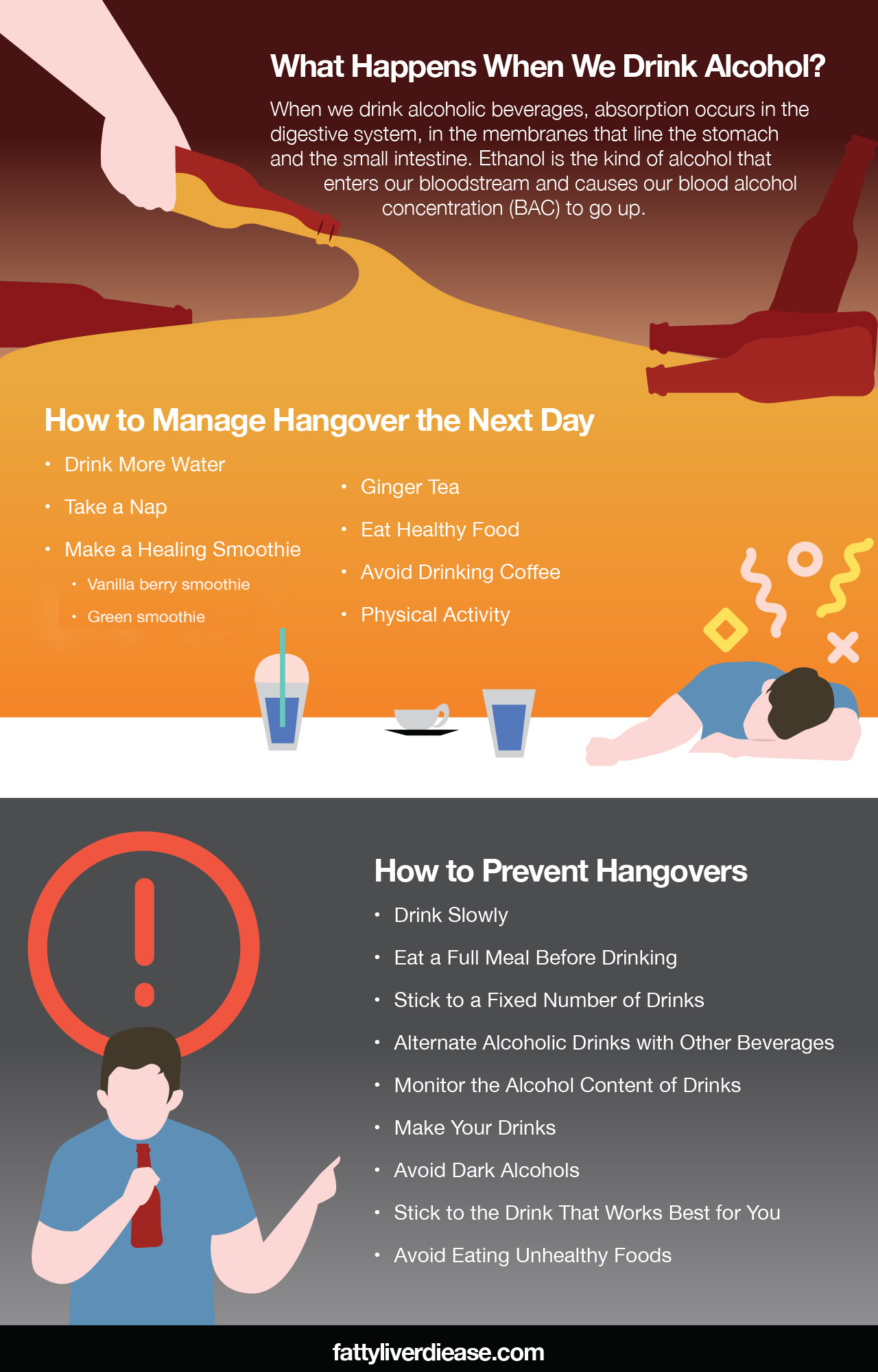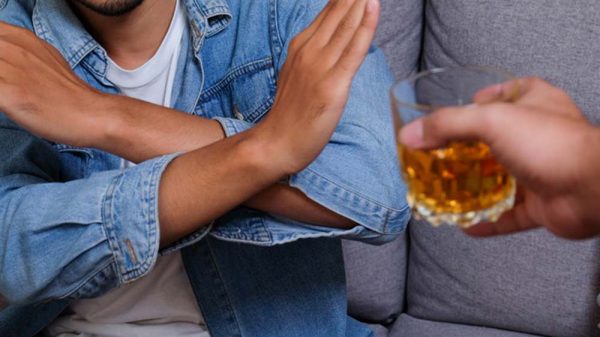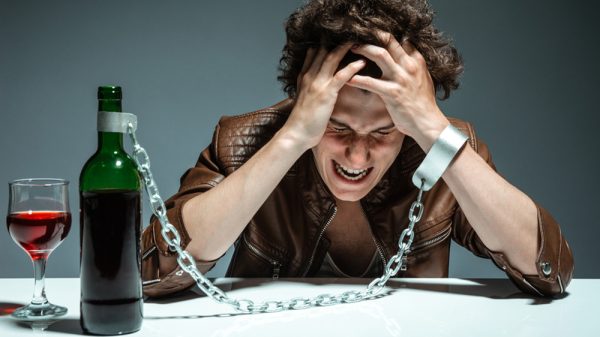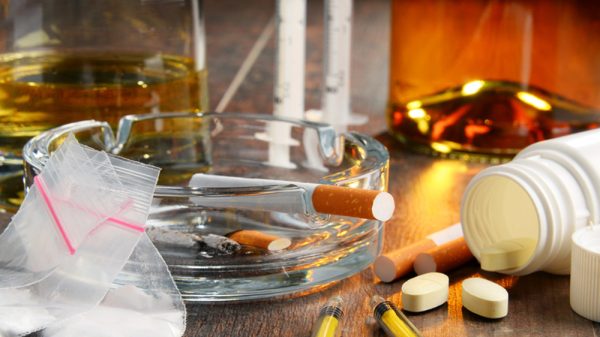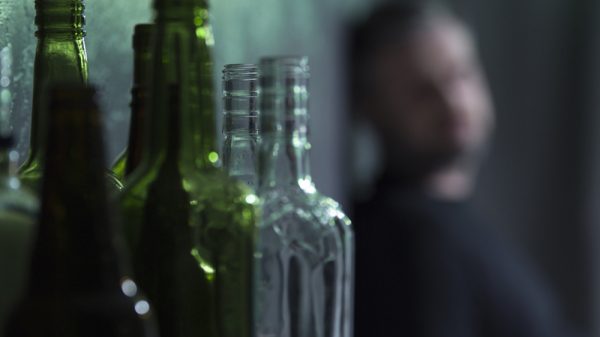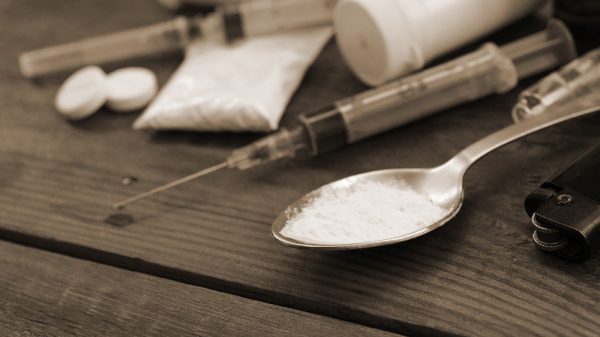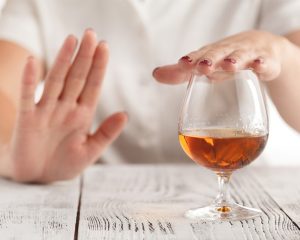Being able to expedite the metabolism of alcohol in the body would be convenient and useful for several reasons; preventing hangovers, reducing reckless behavior like drunk driving, and perhaps avoiding the negative health impacts that alcohol has on the body. Cold showers, eating greasy food, and eating bread are all good attempts and may feel like they have a sobering effect. Sadly, however, these approaches are not effective.
The liver metabolizes alcohol at a fixed rate, regardless of what we eat, drink, or do. To prevent this article from ending right here, we will instead go over ways to feel more sober after drinking, prevent hangover symptoms, and mitigate hangover symptoms.
What Happens When We Drink Alcohol?
Before we dive into ways to prevent a hangover and make a hangover more tolerable, let’s first discuss what happens when we drink alcohol.
When we drink alcoholic beverages like wine, beer, or spirits, the alcohol travels down the esophagus to the stomach. Alcohol absorption occurs in the digestive system, in the membranes that line the stomach and the small intestine. Ethanol is the kind of alcohol that enters our bloodstream and causes our blood alcohol concentration (BAC) to go up.
Once ethanol is in the bloodstream, it is able to travel through all blood vessels in the body and reach all organs. Alcohol is a central nervous system depressant, meaning it interferes with the normal activities of the brain and nervous system. All of the nervous system processes occur more slowly and in an impaired way. This is why alcohol lowers inhibitions and causes a feeling of relaxation. Having a BAC that is too high, however, leads to memory loss or “blacking out,” vomiting, and loss of motor control or clumsiness. At extremely high doses, alcohol can lead to depressed breathing and heart function, which can cause alcohol poisoning and death.
How Long Does It Take to Sober Up?
Once you’ve ingested alcohol, the liver is able to process about 1 fluid ounce of alcohol per hour. This rate isn’t changed by the foods you eat or any activities that you do. Typically, a standard-size drink contains approximately 1 fluid ounce of alcohol. So essentially, your liver can process one drink per hour. If you have two drinks in one hour, then it will take approximately two hours for alcohol to be cleared from your system.
So, unfortunately, no scientifically sound methods exist for how to sober up fast. If you’re looking for how to get alcohol out of your system, the best advice we can offer is to be patient and let your liver do its job.
How long does being drunk last, and how long does it take to sober up? This largely depends on how much you drank and how quickly.
What to Do After a Night of Drinking
You’ve been chatting and dancing with friends, and before you know it, you’ve consumed too many drinks. It happens! What should you do?
1. Don’t Drink More
First things first: do not drink more alcohol. Once you realize you’ve gone over the edge, it’s best to stop drinking. That way, your liver will only need to process what you’ve already consumed. For example, let’s say you’ve drunk three alcoholic beverages over the course of one hour. Your liver has gotten to work processing the first drink, but the second and third drinks are essentially “backlogged” until the liver can get to them. In turn, the alcohol then enters the bloodstream, where it stays until the liver can process it. At the end of the first hour, you will feel significantly more drunk than you will feel after several hours.
2. Drink Plenty of Water
After a night of drinking, it’s important to drink water! Alcohol is a diuretic, making it easy to get dehydrated when drinking alcoholic beverages. Before calling it a night, make sure you down several large glasses of water. A sports drink like Gatorade can help replenish electrolytes that were lost during the drinking process.
3. Snacks
If you are feeling nauseous, snacking may help settle your stomach after you’ve had one too many alcoholic drinks. Try eating something neutral like crackers with peanut butter, toast, or pasta for a queasy stomach.
4. Relax and Get Some Sleep
After you’ve drunk some water and gotten ready for bed, it’s a good idea to try to get a little sleep. The hours of sleep you get won’t be the most restful. While you’re sleeping, the body will spend most of its energy and resources processing the alcohol in your body. The primary focus on alcohol detoxification means that other tasks, like repairing oxidative stress and lowering inflammation, will fall by the wayside. Instead of feeling refreshed in the morning, you will likely feel tired, groggy, and unrested.
Moreover, if you go to bed with alcohol in your system, you are more likely to wake up several times throughout the course of the night. Keep in mind that alcohol is a central nervous system depressant, meaning it also suppresses adrenaline production. Though this may feel relaxing initially, the body often suffers a rebound effect as alcohol clears, causing a spike in adrenaline. If you find yourself waking up in the middle of the night with a racing heart or anxiety, try taking some deep breaths and drinking cold water.
Regardless, getting some sleep will at least support your body as it works to get rid of the alcohol.
Managing a Hangover the Next Day
If you drank a little too much last night, you are likely suffering a gnarly hangover the next day. For more tips, check out this guide to recovering from a hangover.
1. Drink More Water
Even if you chugged a lot of water before bed, you would still need to drink more water the following day. Consuming too many alcoholic beverages can leave you feeling very dehydrated for many hours. It’s a good idea to continue drinking water throughout the day until you feel more hydrated.
2. Take a Nap
Sleep is a restorative state that allows cells throughout the body to recover from the day’s activities and prepare for the next day. However, when you go to sleep drunk, the body uses sleeping hours to rid the body of alcohol. The body is unable to adequately repair from daily activities, let alone the oxidative damage from alcohol. After you’ve had some water, food, and a smoothie, taking a quick nap will help your body repair. Chances are, you’ll wake up feeling better than when you went to sleep.
3. Make a Healing Smoothie
One of the reasons we feel so crummy after drinking alcohol is because alcohol causes oxidative stress in the cells throughout the body. Essentially, alcohol is a poison that must be detoxified by the liver. When our tissues are exposed to alcohol, reactive free radicals are produced. These free radicals react with cells and cause damage.
Here are a few ideas for smoothie recipes that help fight a hangover:
- Vanilla berry smoothie: Blend blueberries, strawberries, frozen banana, soymilk, and ground flaxseed in a blender. Berries are packed with polyphenols that work as antioxidants and help fight oxidative stress and inflammation associated with alcohol consumption. Bananas are rich in potassium and fight against electrolyte loss from drinking. Soymilk and ground flaxseed offer protein. For extra essential amino acids to promote healing, add in a serving of a vanilla-flavored essential amino acid supplement.
- Green smoothie: Try preparing a refreshing green smoothie to boost your antioxidant levels and fight against the after-effects of drinking. Blend apples, ice cubes, kale, spinach, and orange juice in a blender until smooth. Add an orange-flavored essential amino acid supplement for a boost of essential amino acids.
4. Ginger Tea
It’s not unusual to feel nauseous when you wake up with a hangover. Alcohol is an inflammatory agent that irritates the stomach and increases stomach acid production, causing an unpleasant stomach ache. Ginger tea can help soothe the stomach and relieve nausea. Prepare a cup of ginger tea with honey to help quell an angry stomach.
5. Eating Healthy Food
As mentioned above, alcohol consumption causes oxidative stress and inflammation throughout the body. Though it’s common to have cravings for junk food while hungover, instead, eat foods that fight inflammation and support healing. When hungover, eat foods that offer plenty of vitamins, minerals, antioxidants, essential amino acids, and fiber. Great examples of healthy hangover foods include mango, blueberries, blackberries, spinach, whole-grain pasta, chicken breast, low-fat cheese, and low-fat yogurt.
6. Avoid Drinking Coffee
Though in general, coffee is healthy for the liver and may help liver conditions like fatty liver disease, it’s not the best hangover remedy. The caffeine in coffee may increase your heart rate and make you feel more anxious during a hangover. Coffee is also acidic, which can worsen stomach pain and nausea. Plus, coffee causes the blood vessels to constrict, decreasing blood flow in the body and contributing to hangover symptoms.
7. Physical Activity
Exercising is probably the last thing you want to do after a night of drinking. However, gentle exercise can be a healthy hangover cure by increasing blood flow, releasing endorphins, and helping you recover. Plus, the fresh air may help relieve anxiety and help you feel rejuvenated. Just make sure you drink plenty of water before and after exercising since you will be even more prone to dehydration during a hangover.
How to Prevent Hangovers in the First Place
The best way to manage a hangover is by preventing it in the first place. Luckily, there are many ways to enjoy a few drinks while preventing the unpleasant after-effects of alcohol.
1. Drink Slowly
Drinking more slowly is the key to preventing a nasty hangover the next morning. To keep your BAC and alcohol content in your organs from getting too high, aim to drink one alcoholic beverage per hour.
2. Eat a Full Meal Before Drinking
Although it’s impossible to affect the rate at which the liver processes alcohol, you can impact the rate of absorption of alcohol, to some extent. Before you start drinking, aim to have a belly full of food. Ideally, make sure that you ate a full meal with a balance of macronutrients like protein, complex carbohydrates, and healthy fats that break down more slowly. A meal of just simple carbs like white pasta, white bread, and white rice will break down quickly and won’t help too much with slowing down alcohol absorption. Having food in your stomach when you start drinking may slow down alcohol absorption in the digestive tract, meaning your blood alcohol level will rise more slowly.
However, keep in mind that eating before drinking is not protective against getting too drunk, but rather a tool and a good habit.
3. Stick to a Fixed Number of Drinks
Aim to go into the evening with a preset limit of alcoholic drinks you plan to ingest. Having a drink limit can help you stay on track as you’re enjoying drinks. It’s also important to keep track of the number of drinks you have throughout the evening. Keeping track of the drinks you have helps you avoid drinking too much alcohol.
4. Alternate Alcoholic Drinks with Other Beverages
Alternating alcoholic drinks and nonalcoholic beverages can help you slow down your drinking rate. You can include a glass of water as your alternate drink, though if you want to be celebratory and festive, try nonalcoholic cocktails and wine. Make a habit of alternating drinks to prevent a hangover the next day.
5. Monitor the Alcohol Content of Drinks
Different types of wine, beer, and spirits may have varying alcohol contents per serving. In order to keep track of the amount of alcohol you’re drinking, it’s a good idea to monitor how much alcohol is in each drink.
6. Make Your Own Drinks
If you’re at a casual gathering, try preparing your own alcoholic beverage. That way, you have control over how much alcohol you’re putting in your drink. When preparing your drinks, you can pour less alcohol into your glass than a standard drink. This helps you drink more slowly throughout the evening.
7. Avoid Dark Alcohols
Avoid drinking dark alcohol throughout the evening. Dark alcoholic beverages include drinks like red wine, whiskey, dark beer, and rum. The dark color of these drinks results from congeners. Congeners encompass substances like tannins and other alcohols that may be present in the beverages besides ethanol. Congeners are thought to worsen hangover symptoms and inflammation that day after drinking. If you mix several dark-colored alcohols, you may experience an even worse hangover. Combining different congeners can have an additive effect and worsen headaches and inflammation.
Instead, stick to light-colored beverages that contain fewer congeners such as light beer, white wine, and light-colored spirits.
8. Stick to the Drink That Works Best for You
Each person has a different biochemistry and may respond differently to certain beverages. When drinking, stick to the beverages that you know work best for you. If you know that red wine gives you a killer headache, avoid it. If you always feel nauseous after drinking beer, steer clear of it. Always stick to the drink that works best for your body, to help avoid a hangover the next day.
9. Avoid Eating Unhealthy Foods
Avoid ending the night with greasy foods like a large pizza, tacos, or hamburgers and fries. Though it may be tempting to chow down on a large quantity of unhealthy food after a night out, these foods will only worsen inflammation throughout the body. Large amounts of unhealthy food combined with alcohol can worsen your hangover symptoms the next day.
How to Sober Up Fast: The Bottom Line
The liver processes alcohol at a fixed rate: about one standard drink per hour. Unfortunately, there is no way to expedite the rate at which your liver metabolizes alcohol. However, you can utilize strategies to help you avoid a hangover the next day.
